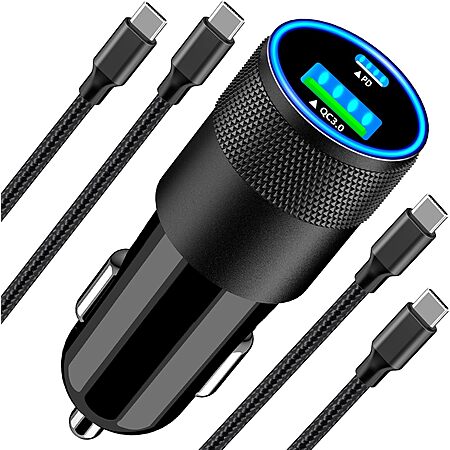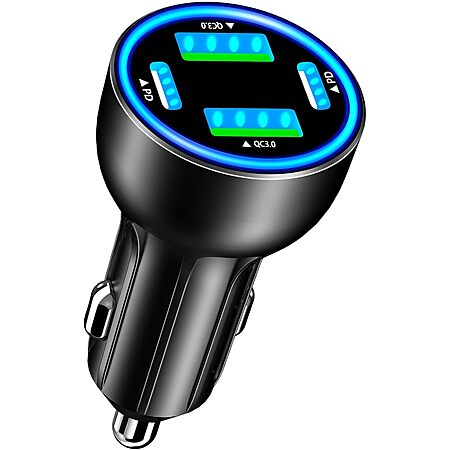frontpageNavy-Wife | Staff posted Jun 04, 2025 05:38 PM
Item 1 of 5
Item 1 of 5
frontpageNavy-Wife | Staff posted Jun 04, 2025 05:38 PM
Rombica 2-Port Up to 75W Car Charger (1x USB-C, 1x USB-A) w/ 2-Pack USB-C Cables
& More$4.05
$8.99
54% offAmazon
Get Deal at AmazonGood Deal
Bad Deal
Save
Share









Leave a Comment
Top Comments
Looks like they're still selling the same model, and there's a father's day sale going on:
https://www.amazon.com/UGREEN-Cha...B0B3D9XW8
24 Comments
Sign up for a Slickdeals account to remove this ad.
Regardless, so a 100w load would blow a 20 amp fuse?!? Run your "amps = watts/volts" to let us know when that would be. Hint...5 volts. Was your car a 6 volt PowerWheel?
And I don't doubt you had a blown fuse, but pretending that a 100w load (or 125-ish watts at 80% efficiency) caused a 20 amp fuse to blow (unless faulty) is just plain silly. There was something else drawing power or there was a problem within the circuit.
Speaking of your "100w load," that inverter was probably pulling 150-200w input (if it was rated at exactly at 100w output). Your inverter, which takes DC to AC then your laptop transformer converts it back to DC far less than "100% efficient" (huge losses at each of those ***three conversions***) compared to a 12v-to-12v (DC-to-DC) device. I'd assume assume your inverter was actually rated at 200-400w output so could pull 250-500w, even if the demand wasn't there.
In your response to the first quote, you mention 10 amps. Now I assume you mean 10 volts, but in the text you quoted I am specifically referencing a scenario with a battery at 12 volts. Are you really claiming that if you turn the key with a 12 volt battery, your engine won't turn over? A car battery can easily drop to 12 volts if your engine is off and you're still pulling power.
As to your comments on the second quote, I never referred to that as evidence, but rather my personal experience. You're the one referring to that as evidence, not me.
Furthermore, I'm not sure where you're getting the idea that my laptop only used 100 watts. I never made that claim, so all the calculations you base on that are irrelevant. As I described, this is before USB-C, so my laptop didn't have the 100 watt limit that most USB-C charging laptops are bound to. My laptop was likely pulling well over 100 watts, which is why it caused a 20 amp fuse to blow in a car with a fully functional battery (and not just once, but multiple times) until I got in the habit of unplugging my laptop before the car was turned off. And yes, of course an inverter is a much less efficient way to power a laptop in a car than a DC-DC converter. After a bit I did buy a 3rd party universal car power port laptop power brick to reduce power draw.
Also, you claim that an inverter pulls power based on its maximum wattage rating, which is false. It only pulls the amount of power necessary for it to provide the power currently being demanded by the device plugged into it.
If you draw 100 watts from the AC plug on an inverter rated for 500 watts, it probably pulls around 120-150 watts from the car power port.
If your laptop draws 160 watts from the power adapter, the power adapter could demand 200 watts from the inverter, which could demand 250 watts from the car power port. As long as your car battery is around 13 volts or higher(such as when the car is running), a 20 amp fuse will likely hold up, provided it's accurately rated and assuming no significant resistance in the car wiring. (realistically, given that fuses have a margin for error and the wires carrying the power though the car do have resistance, the fuse could easily trip at a lower wattage) But, if you shut off the engine while your laptop is still using 160 watts, thus still pulling 250 watts from the car power port, the battery could quickly drop to 12.5 volts, resulting in 20 amps being demanded from the car power port to supply this power.
That is how a 20 amp fuse blows.
Furthermore; not sure what was worse; you confusing your 'years ago' 12V DC to 120V AC inverter back to 12V DC transformer situation with direct 12V DC to 12V DC device....or thinking you are going to be pulling 5 volts from a 12V car accessory outlet to exceed 20A on a 100w load.
FYI: I didn't read the rest, you have proven you have no idea what you are talking about and I have invested enough time trying to help you understand something clearly beyond your grasp....or waiting for you to admit you were wrong in your original claim. No biggie, we all make mistakes but moving goalposts endlessly is not helpful nor makes you less wrong at the end of the day.
BTW. no one else on the planet has blown a fuse with a 100w load on a 10-20A 12V accessory outlet (everything properly working on a 12V circuit of course) ...but thanks for the warning for something that could only happen if I need to charge my laptop on a dead car battery outputting far less than useful voltage.
I mentioned in my previous post that you were somehow missing the point of what I wrote, but if you're not even reading my comments to the end, then I can now understand why you don't understand the basic premise of what I posted.
In any case, I can see you're not interested in continuing this conversation in any meaningful way. So, let's agree to disagree and go our separate ways.
Sign up for a Slickdeals account to remove this ad.
Not to mention, why do you keep insisting we start off with a functionally DEAD BATTERY's voltage when rambling about your endless series of "what ifs" on a situation none of us will ever encounter? Do you plan on on charging your 100w laptop (on a 115W-125W load after non-"lossless" transfer....) from your "10.4v" battery which won't even start the car in question? Afterwards are we going to Never Never Land during this unlikely adventure only you and Ms. Wendy might take part in? If you need directions, it is the second star to the right, straight on till morning.
P.S I'm done, feel free to have the last word...clearly you need it.
Leave a Comment